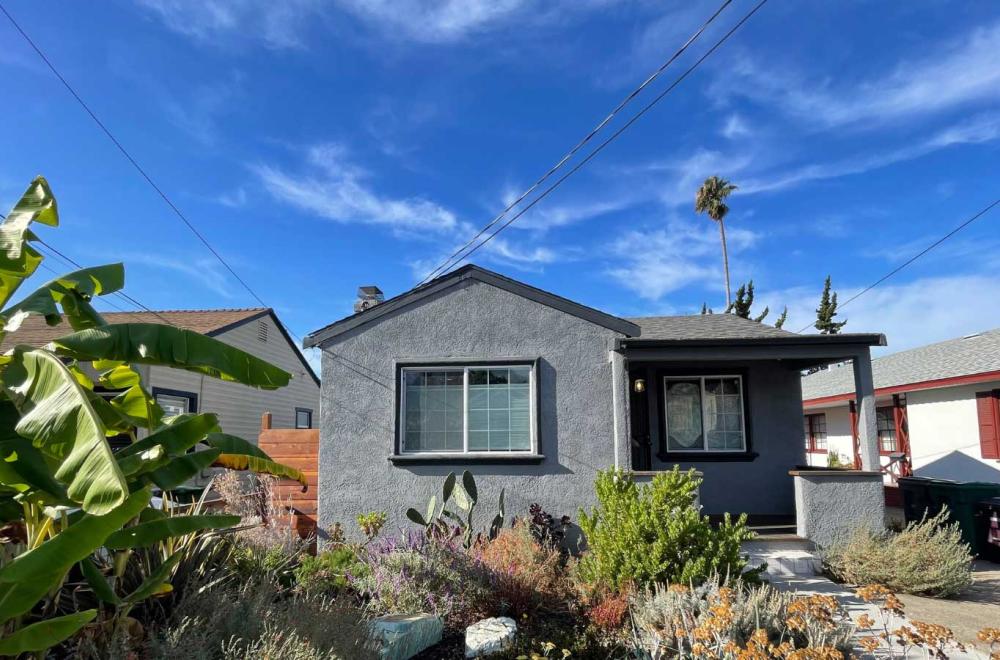December 4, 2023
Topic
As realtors often say, every house has a story to tell. In a quiet community-driven neighborhood in Oakland, there’s a 1940s home that has been given a new lease on life. When Emily Alvarez, BayREN’s Green Labeling Program Lead, and her husband chose to buy their fixer upper in 2016, they knew that it would be an opportunity to create a home that is comfortable and cozy. Seven years later, Emily is now showcasing it as a green home to a group of realtors as part of their training.
Evaluating the Home’s Energy Efficiency
Before embarking on any upgrades, Emily sought to understand the energy efficiency landscape of her home. She obtained a BayREN Home Energy Score (and an associated rebate), which rates a home’s energy efficiency on a scale of 1 to 10. In 2019, their home scored a five. Acting on the recommendations, Emily and her husband made a series of changes that ultimately boosted the score to a perfect ten in 2023. This is how they did it:
Enhancing the Building Envelope and Improving Energy Efficiency
In the realm of energy efficiency, it’s often advised to begin the home upgrade journey with building envelope enhancements. These upgrades focus on improving the components that impact a building’s thermal performance and energy consumption. For Emily, the process began with air sealing. By closing up any openings and preventing leaks that allow indoor air to escape and outside air to infiltrate. This not only helps maintain a consistent indoor air temperature but also keeps unwanted outdoor air pollutants and acts as pest control.
Air sealing goes hand in hand with insulation. Insulation traps heat inside during the winter and keeps heat out during the summer. Emily considered using blow-in insulation for the walls, but due to concerns on piercing plaster, she decided to focus on floor and attic insulation. Floor insulation was complemented with a Vapor Barrier, a thin material that prevents moisture from penetrating the insulation, keeping it dry and mold-free. Although the walls weren’t insulated, the combination of attic and floor insulation significantly improved indoor comfort and reduced energy bills.
After enhancing the building envelope, Emily replaced the inefficient gas furnace with a heat pump for year-round heating and cooling. This appliance offers year-round comfort in a highly efficient manner, as it transfers heat from one place to another instead of generating it. The air sealing, insulation, and heat pump upgrades qualified Emily for BayREN and TECH Clean California (TECH) rebates.
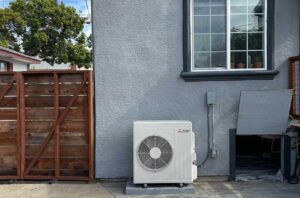
The crawl space of Emily’s home showing the Vapor Barrier (right) and the heat pump condenser unit (left).
A Safer, Faster Kitchen
While not a necessity in Emily’s home journey, upgrading to an induction range was an important personal choice. DIY air quality testing in her kitchen revealed high formaldehyde levels and other pollutants when cooking on a gas range, even with the kitchen exhaust fan and an air purifier running. Emily found that transitioning to an induction range not only improved indoor air quality but also improved her cooking experience through precise heat control. “It is especially fun to cook on an induction stovetop when making a slow cooked meal as I am not constantly turning the heat up and down to retain a consistent temperature.” To install this all-electric appliance, it was necessary for Emily to upgrade to a 240-volt outlet. BayREN provided a rebate to support the shift to an electric induction stove.
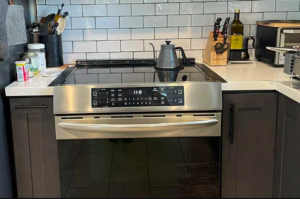
Emily’s induction kitchen upgrade.
“It doesn’t matter how your water is heated!”
With an average useful life of 7-10 years, it is often recommended to replace a gas water heater before it breaks down in an emergency. Anticipating this needed upgrade and to further reduce her reliance on gas, Emily installed a heat pump water heater. She programmed it to heat water during off-peak energy demand hours and vented the cool air it exhausts into the attic to keep the space dry. Like the induction cooktop, it requires some fine-tuning to master the settings, which your contractor can assist you with. Emily shared, “it doesn’t matter how you heat your water, as long as it is hot!” BayREN offers rebates for this upgrade as well as TECH.
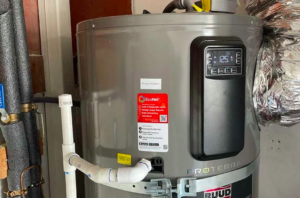
The heat pump water heater ventilating to the attic.
Electrical Panel Upgrade
An upgrade of the electrical panel was necessary to safely operate all-electric appliances, including the heat pump water heater, induction range, and electric car charging station. “Upgrading my panel was unexpectedly the hardest part of my journey. It can take a while and phasing it with the rest of the electrification installation was challenging.” Emily also had to rewire her home to remove knob and tube and support the panel upgrade and electric appliances. Be sure to start this process early and really consider whether panel upsizing is necessary to save time and money. Emily obtained a TECH rebate to offset part of the upgrade costs.
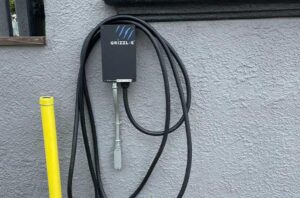
The at-home electric vehicle charger installed in the driveway.
Drought-Tolerant Native Garden
The home’s exterior also received a makeover with a drought tolerant garden. Emily’s garden started with sheet mulching, an organic gardening technique that avoids plastic and chemicals to enhance the soil. Sheet mulching enabled them to create a garden that suppressed weed growth, conserved water, and minimized maintenance. Emily used education information from StopWaste to start the sheet mulching journey.
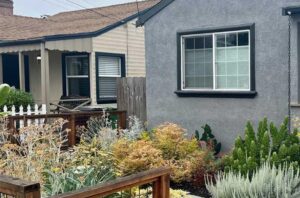
Emily’s drought-tolerant garden.
Future Solar Panels and Battery Storage
Emily plans to install solar panels and battery storage in the future. This upgrade will allow her to produce her own energy, contribute excess energy to the grid, and have power during emergency outages. Due to a power outage during a transformer fire, Emily was unable to use the induction cooktop for an 8-hour timespan. This unforeseen situation forced them to use their outdoor grill for the day, however they still had access to hot water reserve. “While we don’t come across these situations often, we are hoping to be better prepared for future power outages while producing our own solar energy.”
Associated Costs
Over the course of a couple years, Emily and her husband meticulously transformed their home. The total cost of their energy upgrades – including electrical upgrades, building shell measures, appliances and equipment, and an EV charger – amounted to $46,000 for improved comfort and sustainability, with $13,000 covered through rebates from BayREN, TECH, and Chevy (for their electric vehicle charger). Their journey began in 2019 when they first acquired a Home Energy Score (HES) to assess their options. They carefully planned their energy-efficient upgrades, aligning them with rebate programs like TECH, which are only accessible periodically, ensuring they maximized their financial benefits. Subsequently, they strategically timed their renovations when they had the necessary financing in place, leveraging available rebates to make their project more cost-effective.
As a result of their home upgrade project, Emily and her husband not only improved their home’s comfort but also set themselves up for significant savings on their monthly utility payments. When investing in a house, you are not just committing to a mortgage payment, you are also investing in your monthly utility payment. When gas prices increased in the winter of 2023, Emily was comfortable in her home and paid much less in her all-electric home compared to heating with an inefficient gas furnace. Their bills were lower than many of their friends, even accounting for charging an electric vehicle. Emily expects their bills to reduce further when they install solar panels.
Key Takeaways
Emily and her husband’s journey to enhance their home was a labor of love. Emily aptly says, “It’s hard to put a price on comfort and health,” but she hopes that any future realtor and buyers will appreciate the upgrades they’ve made. From insulation to induction cooktops, Emily’s home is a glimpse into the future opportunities for many homes in the Bay Area.
To embark on your own home upgrade journey, consider consulting with BayREN’s no-cost Home Energy Advisors: https://www.bayren.org/energy-advisor.
Are you a realtor looking to learn about green homes? Check out our events calendar for our next NAR’s GREEN Designation Class to learn about the issues and opportunities of energy efficiency in the real estate market: https://www.bayren.org/events-training





